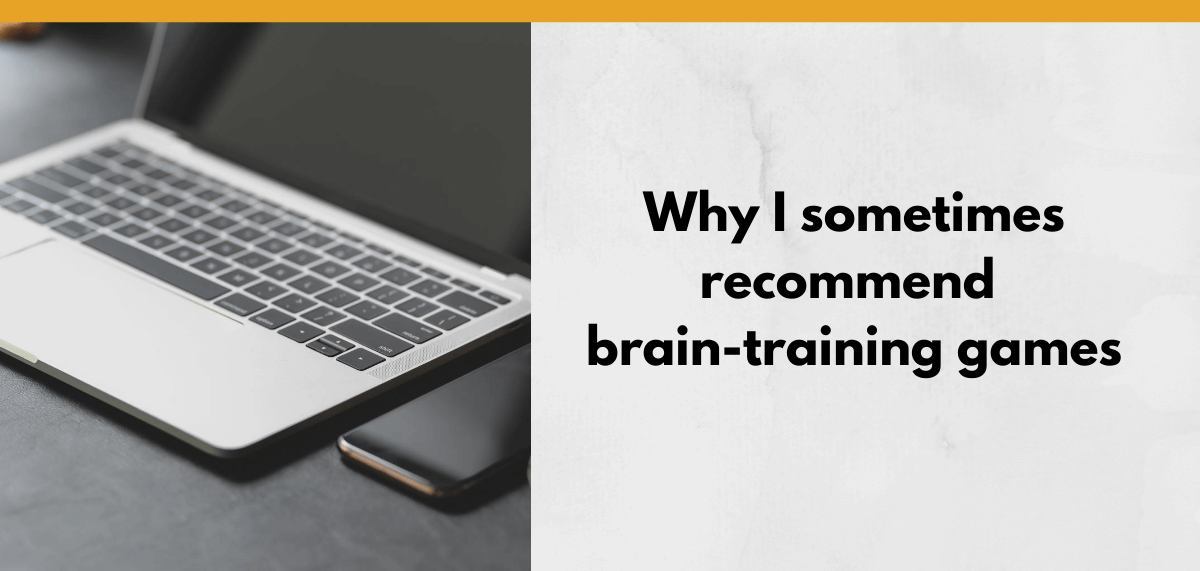Many of my patients ask for brain-training games. Not surprising, given that the brain-training game industry is projected to reach $8.06 billion dollars worldwide by 2021. But brain-training games are controversial, with inconsistent research evidence. Read on to learn about the controversy, and why I still sometimes recommend them.
Outline:
- Why are brain-training games so popular?
- Why are brain-training games controversial?
- Simons et al (2016)’s review of the brain-training literature.
- Why I sometimes recommend brain-training games.
- Evidence says to train strategies to improve cognition.
- Which brain-training games do you recommend?
- References.
- Related Eat, Speak, & Think posts.
Why are brain-training games so popular?
I think most people have the intuitive idea that we can exercise the mind, just like we can exercise the body. We have the sense that if we play games that challenge our attention, memory, language, and other cognitive skills, that we’ll improve those skills for daily activities.
Simons et al (2016) state that “the promise of brain training is based on the following reasoning”:
If measures of cognitive ability predict real-world performance and success, and if that success depends on those cognitive abilities, then practicing those abilities should improve outcomes – and ultimately improve people’s lives.
(Simons et al, 2016, p. 105)
The idea that we can improve our mental abilities by playing games or going to a “mental gym” is enticing. And commercial companies spend a lot of money marketing their games as a way to improve those skills.
Why are brain-training games controversial?
The problem is that we don’t have solid evidence that brain-training games will improve cognitive skill for daily activities or protect people from cognitive decline. Yet, many companies still imply or outright make these claims.
Companies overstate the evidence
For instance, in 2016 Lumosity agreed to pay a $2 million settlement to the FTC for the allegation that “they deceived consumers with unfounded claims that Lumosity games can help users perform better at work and in school, and reduce or delay cognitive impairment associated with age or other serious health conditions.” Lumosity falsely advertised that they had scientific evidence supporting these claims.
In addition to scientific evidence, social proof is a large factor in how people choose to spend their money and time. Yet Lumosity featured testimonials that had been solicited for a chance to win large prizes, “including a free iPad, a lifetime Lumosity subscription, and a round-trip to San Francisco.”
Scientists don’t agree on what the evidence means
In October 2014, the Max Planck Institute for Human Development published a letter signed by more than 70 neuroscientists and psychologists. The scientists objected to the marketing practices of companies selling brain training programs. It’s well worth a read, but here’s their conclusion:
We object to the claim that brain games offer consumers a scientifically grounded avenue to reduce or reverse cognitive decline when there is no compelling scientific evidence to date that they do. The promise of a magic bullet detracts from the best evidence to date, which is that cognitive health in old age reflects the long-term effects of healthy, engaged lifestyles. In the judgment of the signatories, exaggerated and misleading claims exploit the anxiety of older adults about impending cognitive decline. We encourage continued careful research and validation in this field.
Two months later, a separate group of more than 130 scientists published a rebuttal. They agreed with a number of statements made by the Max Planck letter, but went on to say:
We cannot agree with the part of your statement that says “there is no compelling scientific evidence” that brain exercises “offer consumers a scientifically grounded avenue to reduce or reverse cognitive decline.” … There is, in fact, a large and growing body of such evidence. That evidence now includes dozens of randomized, controlled trials published in peer-reviewed journals that document specific benefits of defined types of cognitive training. Many of these studies show improvements that encompass a broad array of cognitive and everyday activities, show gains that persist for a reasonable amount of time, document positive changes in real-life indices of cognitive health, and employ control strategies designed to account for “placebo” effects. While we can debate strengths and limitations of each study, it is a serious error of omission to ignore such studies in a consensus reviewing the state of this science.
Simons et al (2016) review of the brain-training literature
Simons et al (2016) was inspired by the dueling letters I quoted from above. They wanted to answer how two sets of brain scientists could have differences of opinion about the efficacy of brain training programs or brain games. Their paper is quite thorough at 89 pages, which I accessed through ResearchGate.
Key findings
- Solid evidence that brain training improves performance on the trained tasks.
- Less evidence that this improves performance on closely-related tasks.
- Little evidence that performance improves on distantly-related tasks or on everyday tasks.
Problems with brain-training research
Simons et al (2016) discuss in details the gold standard for experimental design and analysis. They state that “no published interventions have yet conformed to all of these best-practice standards… As long as such preliminary studies explicitly note all of their limitations, note clearly that their findings are exploratory,and do not oversell their implications of their results, less rigorous methods might not be as problematic” (p. 120).
The paper goes into great detail about the problems with the research, but here are a few main points.
- Not enough participants.
- Test-retest effects were poorly controlled.
- Participants were aware of which experimental group they were in.
- Active control groups weren’t given an adequate cognitive task.
- Placebo effects weren’t adequately controlled.
- Few experiments reported their design and analysis plan ahead of time, allowing for the possibility of altering the analysis or selective reporting of results.
- The same study may be reported in numerous different research papers, without making clear they were all from the same set of data.
- Improper statistical analyses, such as not correcting for multiple tests which increases the likelihood of false positives.
The bottom line
In sum, despite a large number of published papers reporting tests of the effects of brain-training interventions, the evidence that training with commercial braintraining software can enhance cognition outside the laboratory is limited and inconsistent.
Simons et al (2016, p. 173)
Why I sometimes recommend brain-training games
As a speech-pathologist, my preference is to recommend that my patients engage in meaningful, real-world activities for cognitive stimulation. For instance:
- Household projects.
- Arts and crafts.
- Learn a new skill.
- Make a new recipe.
- Follow current events.
- Read or listen to a new book.
- Watch videos such as TED talks.
- Create a life timeline.
- Scrapbooking or journaling.
- Geneaology research.
- Volunteer online or in person.
I make clear that, as far as we know, the best way we can improve performing some activity is to practice doing that activity. My goal as an SLP is to either improve their abilities and/or modify the activity so they can still enjoy doing the things they like to do.
But I do sometimes consider brain activities, brain games, and even brain-training programs.
Factors I consider
When I do recommend brain activities, brain games, and brain-training programs, I look for free or low-cost options, and I don’t recommend costly subscription-based programs. The only exception is when my patients already belong to AARP, as that organization offers free access to Staying Sharp.
Here are some things I consider:
- Are they asking for ideas?
- How is my patient spending their time now?
- Do they spend hours watching TV or sleep because they’re bored?
- Are they interested in brain activities?
- What did we work on in therapy?
I can think of two scenarios when I do recommend brain activities:
Already doing something, but not related to their goals
I often meet people who enjoy doing some sort of puzzle or game that isn’t obviously related to their cognitive-communication impairment. They enjoy spending some quiet time each day engaging in these hands-on leisure activities. I will often suggest they consider adding in other activities that are more closely related to the skill they’d like to improve.
Spending most of the day in passive leisure pursuits
When I meet someone who spends most of their day watching television (or sleeping out of boredom), I try to find a way to help them resume former pastimes if possible. If that’s not possible, then I try to find something new that they’re able to do that offers some cognitive stimulation.
Whenever possible, I try to find something interactive, so that they socialize more. I recently wrote about how I used television to improve my patient’s communication. I also consider it a success if my patient turns off the television to do some sort of cognitively-stimulating activity.
Even so, whenever I can, I try to explicitly train strategies that my patients can apply to future situations that may arise. For instance, I wrote about how I taught my patient memory strategies that she went on to use to learn additional new information that was important to her.
Evidence says to train strategies to improve cognition
McCabe et al (2016) followed the Simons article with suggestions for research-based cognitive techniques. They report that cognitive strategy training has over 100 years of research to support it. But, as they say, it takes intentional effort and is “likely viewed as less enjoyable than playing a video game.”
List of cognitive strategies to improve memory
- Meaning-based elaboration.
- Use the self-schema – the learner makes connections to own life.
- Elaborative interrogation – the learner asks themselves questions during learning.
- Self-explanation – describe or explain concepts in greater detail.
- Imagery or visualization.
- Mnemonics.
- Testing or retrieval-based learning.
- “Practicing retrieval of information from long-term memory is a potent learning event in and of itself” (p. 189).
- Spacing or distributed processing.
- Research has shown a large benefit from spacing learning sessions out across time.
Which brain-training games do you recommend?
If you recommend brain-training games, when do you do it? Do you have particular activities, apps, or websites that you recommend frequently? Leave a comment below. I’m always looking for new ideas!
References
- “A Consensus on the Brain Training Industry from the Scientific Community,” Max Planck Institute for Human Development and Stanford Center on Longevity, accessed 8/21/2020, http://longevity.stanford.edu/a-consensus-on-the-brain-training-industry-from-the-scientific-community-2/
- McCabe, J. A., Redick, T. S., & Engle, R. W. (2016). Brain-Training Pessimism, but Applied-Memory Optimism. Psychological science in the public interest : a journal of the American Psychological Society, 17(3), 187–191. https://doi.org/10.1177/1529100616664716
- Simons, D. J., Boot, W. R., Charness, N., Gathercole, S. E., Chabris, C. F., Hambrick, D. Z., & Stine-Morrow, E. A. (2016). Do “Brain-Training” Programs Work?. Psychological science in the public interest : a journal of the American Psychological Society, 17(3), 103–186. https://doi.org/10.1177/1529100616661983
Related Eat, Speak, & Think posts
- Free multimedia resources for the SLP.
- 5 easy steps to remember names.
- 10 practical cognitive therapy activities.
- Writing SMART memory goals for a reluctant patient.
Lisa earned her M.A. in Speech-Language Pathology from the University of Maryland, College Park and her M.A. in Linguistics from the University of California, San Diego.
She participated in research studies with the National Institute on Deafness and other Communication Disorders (NIDCD) and the University of Maryland in the areas of aphasia, Parkinson’s Disease, epilepsy, and fluency disorders.
Lisa has been working as a medical speech-language pathologist since 2008. She has a strong passion for evidence-based assessment and therapy, having earned five ASHA Awards for Professional Participation in Continuing Education.
She launched EatSpeakThink.com in June 2018 to help other clinicians be more successful working in home health, as well as to provide strategies and resources to people living with problems eating, speaking, or thinking.



Be First to Comment